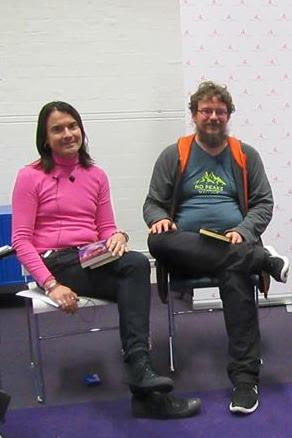#IndieAuthorFringe How Authors Work With #Editors @rohanquine @agnieszkasshoes bit.ly/2nATyj5 Share on X
Though it may be hidden from public view, teamwork is important to almost any top-quality publication. And no team is more important than an author and their editor. In this session, author Rohan Quine and his editor Dan Holloway will take you through what that relationship is like from the inside. They will go through the various stages of the editing timeline one by one, from the initial late-night conversation in a Soho café about the finer points of “Blade Runner” to the final cut, offering an insight into their unique, humorous, and often surreal interplay and the book that it built, and demonstrating just what you should expect when you enter the editing process.
Click here to find out more about Rohan Quine and Dan Holloway
 Completing a novel is a big achievement, now you’ve got to turn your manuscript into a published book. First stop, editing. Steven Spatz, President of BookBaby discusses all things editorial, so you too can set up the perfect relationship with the perfect editor for your book.
Completing a novel is a big achievement, now you’ve got to turn your manuscript into a published book. First stop, editing. Steven Spatz, President of BookBaby discusses all things editorial, so you too can set up the perfect relationship with the perfect editor for your book.
This post is excerpted and adapted from Steven's book The End. Now What?! 6 Steps to take your manuscript to market in 6 Weeks.
It is perfectly okay to write garbage – as long as you edit brilliantly. –C. J. Cherryh
I can’t say it strongly enough: Editing is an absolute must if you want your book to reach its full potential. There isn’t a writer on this planet who doesn’t benefit from some level of editing. That includes me and you. I’m pretty certain Moses was coming down from Mt. Sinai with 14 Commandments until divine editing intervened to make the final product more concise, punchy and above all, memorable.
Now that I’ve gone on the record about the need for editing, I’m living in mortal fear that someone, somewhere is going to find a typo and misspelling in this post. Look, typos happen to the best of us – and I’m surely not in that company. But as I write these words and proceed to my final draft, I fully expect them to be tweaked, modified, changed, scratched out, and made better by the efforts of a skilled editor. I can hardly wait! Errors can make the writer appear uneducated and unprofessional.
Let’s say your book is something that helps promote your career or business. If you are careless about what you publish, readers may wonder if you're as careless with the products or services you provide.
Correcting these kinds of errors is just one level of editing. Sentences, paragraphs, and pages need to work together. People with good English grammar don’t necessarily have the skills or training to organize and present content well. If key points are missing, buried, or unclear, readers may not keep reading. And the relationship is over.
Editors will also check for consistency in the story, for repetitions, flow, rhythm and transitional phrases. They will check on tone and tense, and will provide suggestions on certain sections that do not read well. They can be asked to check facts and statistics.
But be prepared: Editing is going to cost you something out of pocket. Is this a question of “you get what you pay for?” Not necessarily. For those on a Ramen Noodle budget – do not despair! There are some free online options for you to use.
But consider this: Not editing has its own hidden costs. Poor grammar will drive away readers, agents, and potential reviews. Your book could be chock full of grammar, punctuation, and spelling errors that will jerk readers out of the reading experience. It’s the editor’s job to find and fix those errors. Editing is an investment matched only by the investment of your hard work and time getting the book to this point. Whatever you end up paying for an outside editor, it’s going to be worth it.
I suggest you allow four weeks for the editing process, from finding your editor to getting back your fully-edited manuscript. First you need to…
Determine the type of editing you need
Proofreading. Line Editing. Content Editing. There are all kinds and flavors of editing to choose from, and price tags to match. What do they entail? Let’s try to sort out and explain the different levels of editing, starting with the most basic and working our way up.
- Proofreading. It’s also called “word level” editing and is the simplest form of editing. It’s also usually the cheapest. Proofreading is for writers who don't need help with sentence structure or the content of the book itself, but need someone to simply go over the text for basic grammatical and spelling errors. It usually takes an editor about two weeks to proofread a full-length manuscript. The purpose of proofreading is to have someone who has never read your manuscript go over each word for errors that might have escaped your attention, which will happen at least a few times in a full-length manuscript. It’s the simple stuff: their/they’re/there kind of things. A lot of these errors are found using an online spell check of course, but I wouldn’t trust my final product with it.
- Copy Editing. Also known as “sentence level” editing, this is the most popular type of editing offered. It’s a bit more detailed than proofreading as it addresses grammar, usage, and consistency issues. I’d also call it “Quality Control” editing because of the small-yet-critical details that are checked over. For instance, what if you call out a character’s deep, penetrating blue-green eyes on page 27, but by page 336 they’ve turned into a dazzling emerald color? Your copy editor should be able to spot that error.
Maybe it’s a story detail – a town name, the name of pet in the plot – that’s mentioned 24 times. A line editor makes sure it’s the same each of those 24 occasions. So in addition to consistencies in spelling and punctuation (colour or color?), a copy editor is paid to find issues of continuity that don’t add up.
- Line editing. Also called stylistic or paragraph editing, this kind of editing takes it up a notch above pure grammar issues. A good line editor can recast sentences for clarity and flow, or move sentences around so your meaning is clear. Stylistic editing always aims to preserve the author’s voice, first and foremost. Line editors also deal with sentence length, excessive use of adjectives, use of jargon or a vocabulary level that doesn’t match the target audience. If you think your manuscript is basically complete but might have plot holes, limited characterization, factual errors or syntactical problems, line editing is probably what you need.
A great line editor can help with those all-important paragraph transitions that can make a book stilted. The purpose of line editing is to tie together loose ends in your manuscript and to make sure the story flows and has a rhythm and pulse readers will enjoy. For non-fiction, line editing will catch factual errors and will also help to separate chapters and paragraphs so that they make more sense.
- Substantive Editing. This is sometimes called developmental or big-picture editing. A substantive edit can be fairly expensive, and often involves the rearranging, deleting, adding, and rewording of entire pages and chapters. Every book has its trouble spots – maybe the plot is lost in reams of background information. Perhaps the characters are difficult to distinguish from one another. This level of editing has less to do with the mechanics of the book than the psyche of the manuscript. Many books are improved when large chunks of text are moved around, and possibly even cut. This editor addresses the structure of a book – how everything hangs together.
If your book requires a substantive edit, you should probably forget about our six week timeline right now and get it into order. It can be very expensive if you need to address a book’s structure after it has been completely written.
The cheapest way to address big-picture conflicts is to get help addressing the problem before you spend much time writing it. Want to know for sure? Then try this: Send your most trusted friend in the writing community a detailed outline or plot summary to see if any potential holes come to light.
Is editing really worth it?
In a word: Yes. This is an area a lot of self-published authors have chosen to short change, and it has cost them. Consider the return on investment: If you choose to go the traditional publishing route, a literary agent will be impressed with your tight, cleanly written prose. If you’re going direct and publishing yourself, the requirements for editing are just as strict. In fact it’s even more vital for you to have a set – or sets – of other eyes on your prose before it hits the marketplace because your writing reputation is on the line. No subject matter or genre is exempt from this requirement.
It’s nearly impossible to quantify the effect of an editorial professional’s contribution, and in many cases, the editing you don’t notice is the best kind. In a sense, it’s a leap of faith to hire an editor. There’s no guarantee that employing an editor (even one armed with an impressive resume or glowing testimonials) will result in huge sales when it finally hits the stores. But if you’re careful, you’ll inevitably reap the benefits of better quality content.
#IndieAuthorFringe 6 steps to take your fiction to market in 6 weeks @Bookbaby bit.ly/2mjg5ku Share on XClick here to find out more about Stephen Spatz



 Though it may be hidden from public view, teamwork is important to almost any top-quality publication. And no team is more important than an author and their editor. In this session, author Rohan Quine and his editor Dan Holloway will take you through what that relationship is like from the inside. They will go through the various stages of the editing timeline one by one, from the initial late-night conversation in a Soho café about the finer points of “Blade Runner” to the final cut, offering an insight into their unique, humorous, and often surreal interplay and the book that it built, and demonstrating just what you should expect when you enter the editing process.
Though it may be hidden from public view, teamwork is important to almost any top-quality publication. And no team is more important than an author and their editor. In this session, author Rohan Quine and his editor Dan Holloway will take you through what that relationship is like from the inside. They will go through the various stages of the editing timeline one by one, from the initial late-night conversation in a Soho café about the finer points of “Blade Runner” to the final cut, offering an insight into their unique, humorous, and often surreal interplay and the book that it built, and demonstrating just what you should expect when you enter the editing process.


[…] How Novelists Work With Editors: Rohan Quine & Dan Holloway […]
[…] How Novelists Work With Editors: Rohan Quine & Dan Holloway […]